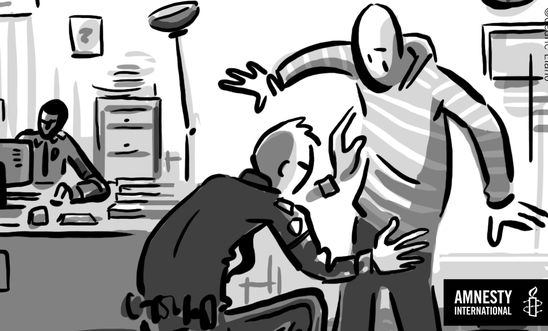
Press releases
France: 'Dehumanising' counter-terror measures being used to unjustly punish people - new report

‘The state of emergency has been lifted only to reveal a permanent and draconian state of securitisation’ – Rym Khadraoui
‘They ruined my life. It is worse than a prison sentence because we are in prison while being outside. At least in prison, there is no alternative' - Rochdi
‘Dehumanising’ counter-terrorism measures in France have been used to unjustly punish people without charge or trial, leaving many languishing in a legal limbo, a new report from Amnesty International has found today [22 November].
Despite the lifting of state of emergency measures in October 2017, the 40-page report - Punished without trial: The use of administrative control measures in the context of counter-terrorism in France - reveals how the imposition of control orders is bypassing the ordinary criminal justice system in France, imposing severe restrictions on people’s rights.
Often based on secret information, control order measures have allowed the Ministry of Interior to impose a wide range of restrictions on people, including forbidding individuals from leaving a specific town, requiring them to report to the police daily, and prohibiting them from contacting certain people.
These measures can be imposed on the basis of concerns over what someone might do in the future, rather than on any criminal act committed. Amnesty is concerned that “pre-crime” initiatives such as these can have a dramatic impact on the lives of those affected and their families.
Amnesty’s report shows how the counter-terrorism measures have been used in a discriminatory fashion by the authorities, with communities such as the French Arab and Muslim communities impacted.
In one case, 30-year-old Rochdi was subject to an administrative control measure that assigned him to the small town of Echirolles for a year-and-a-half where he was unable to leave to visit his mother. During that time, despite a requirement to work imposed on him by a judge, he was unable to find work due to restrictions imposed on him by his control order. He told Amnesty:
“They ruined my life. It is somehow worse than a prison sentence because we are in prison while being outside. At least in prison, there is no alternative.”
Rym Khadhraoui, Amnesty International’s West Europe Researcher, said:
“Measures introduced under the state of emergency were intended to be exceptional and temporary, but have now been firmly embedded into ordinary French law. They are damaging people’s lives by ruthlessly stripping away basic rights.
“France has created a second-tier justice system which targets people based on broad and vague criteria, relies on secret information, and fails to offer a meaningful opportunity for them to defend themselves.
“The state of emergency has been lifted only to reveal a permanent and draconian state of securitisation. Extraordinary measures have been normalised, evidence has been substituted for secret intelligence, and people are being persecuted rather than prosecuted.
“Whilst protecting people from violent attacks is vital, side-stepping the criminal justice system in order to target people on the assumption that they might commit crimes in the future is absurd and unjust. These control orders must be scrapped.”
In addition to the control orders adopted last year, existing control orders have been used against people to prevent them from leaving the country. Kamel Daoudi has been subject to an existing control order for more than ten years. Under the order he is forced to live in a village more than 400km away from his family and required to report to a police station three times a day and respect a nightly curfew. French authorities refuse to renew his provisional residence permit and cannot send him to his country of nationality, Algeria, due to a risk of torture. As a result, he is effectively indefinitely trapped. He told Amnesty:
“This measure is dehumanising. My whole life is organised around the restrictions placed on me. It reduces my life to something that is very absurd.”
The report also explores how people targeted under the state of emergency and who were not subsequently investigated or charged, are still suffering severe consequences. People reported feeling traumatised by the actions of the authorities with continuing psychological harm and stress for them and their families. Amnesty is concerned that current control measures could have similar long-lasting effects.